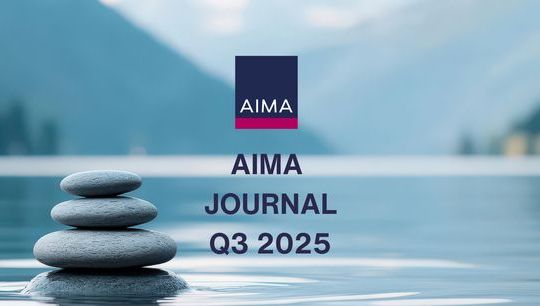What’s in store for the hedge fund industry in 2022?
By Tom Kehoe, MD, Global Head of Research and Communications, AIMA
Published: 20 December 2021
Despite fresh new threats from Coronavirus variants, assets under management for the hedge fund industry continues to break new records. While the implications of the pandemic continue to reverberate, much knowledge has been assimilated that resonates with hedge fund organisations about their people, technologies and cultures. Its investment strategies are also well positioned to have an even greater influence on investment portfolios in the year ahead. Below are the key themes that we see for the hedge fund industry over the course of 2022.
War on talent to intensify:
Talent management remains the number one business priority with fund managers acknowledging an industry that demands a greater work-life balance, in addition to the imperatives of being more diverse, equitable and inclusive. Looking ahead, the next hiring frontier will be to secure ESG expertise in-house, although exactly what characteristics the role of an ESG specialist will have remains an open debate.
ESG integration will continue apace:
Responsible investing and ESG will continue to gain prominence in 2022 as assimilation into all aspects of the alternative investment industry continues, from investment strategies in public and private markets to risk management and internal hiring and promotion policies through bolstered DE&I strategies.
The lack of consistent, comparable corporate data that is widely considered to be the primary headwind for the sector and we will see enhanced regulatory reporting frameworks across all regions, but primarily in the EU with SFDR, which by its scope will have global implications. Standard setters are increasingly turning their attention to an overhaul of corporate reporting requirements, improving the ability of investment managers to develop products that prioritise ESG considerations and report against key ESG metrics.
Hedge fund digital assets allocations will pick up steam in 2022:
The past year witnessed a number of significant milestones in the digital assets sector including the first country adopting Bitcoin as legal tender as well as regulators globally discussing how to create fair cryptocurrency regulations.
While the capital invested in digital assets is still largely from high-net-worth investors and family offices, curiosity from institutional investors continues to grow with several large institutional investors stepping into the crypto space. As we receive greater regulatory clarity, development of sound operational practices, we would expect to see traditional hedge funds increase their investment in this emerging asset class.
New blueprint for hedge fund operating model to emerge:
The pandemic has brought about significant changes in the way hedge funds operate. As the world exits this period, business operating models are being re-evaluated as hedge funds examine core processes, cost structures and hybrid working environments as they drive for greater efficiency in a new normal. The convergence of trends emerging from the pandemic as well as more established market features will drive the industry to become more efficient and strategic with their resource allocation taking advantage of new technologies, outsourced services and investment tools.
Hybrid hedge strategies:
AIMA research throughout 2021 highlighted increasing demand by institutional investors for hedge funds that could offer exposure to both public and private markets, with a particular interest in private credit and venture capital. The strong performance of private equity and credit in 2021 has made more investors curious about its diversifying potential for their portfolio, leading to increasing allocations to these fund types.
The investor base for private credit will continue to expand next year with private wealth and retail capital becoming a more prominent part of the sector’s capital raising activity. Fund managers that offer exposure to these markets will be rewarded with greater allocations, albeit have to also contend with handling the operational challenges of having a greater number of strategies and tailored products.
Continued movement away from manager led products to investor tailored solutions:
The alignment of interests between managers and investors continues to strengthen as investors play a more active role in portfolio construction. The next year will see continued movement away from manager-led products in favour of more tailored solutions and value advisory services.
New partnerships are also emerging with co-investment arrangements becoming more popular in both private and public markets while Special Purpose Acquisition Companies (SPACs) are being increasingly taken up by hedge funds.
Volume of regulatory scrutiny to increase:
Regulatory change is an evergreen issue for the alternative investment industry, but the growing volume of regulatory scrutiny coming down the pipe in 2022 means it is expected to be a headline issue for market participants for at least the next year. Scheduled reviews of major regulatory frameworks in the EU – including AIFMD, MiFID II and short selling regulations – are coming alongside new ESG-focused rules and ongoing regulatory divergence with the UK. Across the Atlantic, the SEC has signalled its intent to re-open the rule book for hedge funds, invoking the need to improve market transparency. Regulators and policymakers across APAC are also far from complacent and compliance teams across the region are expected to have their hands full for the foreseeable future.
Hedge fund industry renaissance:
Bouyed by strong performance by hedge funds over the past two years, investors are taking notice of the industry’s renaissance, investing in both public and private markets as they seek diversification away from low-interest bond markets and high valued equities. With most forecasts for the coming year predicting continued market volatility as well as the introduction of monetary tightening to curb the threat of higher inflation; this could spell trouble for bond and equity markets and economic growth. Forecasts for returns from the 60/40 model next year are low to single digits.
By contrast the case for active investing in this environment grows. The benefits of investing in alternatives, (for their ability to diversify the portfolio as well as the opportunity to select fund managers that could deliver returns better than what is available from passive investing) will continue to attract capital over the coming year and ultimately could see assets in the hedge fund industry to be closer to $5 trillion over the coming 12-18 months.
To read about more of these trends and the very latest thought leadership on alternative investments, please go to www.aima.org.
Media Contact:
Drew Nicol, Research and Communications
AIMA
About AIMA
The Alternative Investment Management Association (AIMA) is the global representative of the alternative investment industry, with around 2,100 corporate members in over 60 countries. AIMA’s fund manager members collectively manage more than US$2.5tn in hedge fund and private credit assets. AIMA draws upon the expertise and diversity of its membership to provide leadership in industry initiatives such as advocacy, policy and regulatory engagement, educational programmes and sound practice guides. AIMA works to raise media and public awareness of the value of the industry.
AIMA set up the Alternative Credit Council (ACC) to help firms focused in the private credit and direct lending space. The ACC currently represents over 200 members that manage US$450bn of private credit assets globally.
AIMA is committed to developing skills and education standards and is a co-founder of the Chartered Alternative Investment Analyst designation (CAIA) – the first and only specialised educational standard for alternative investment specialists. AIMA is governed by its Council (Board of Directors).







